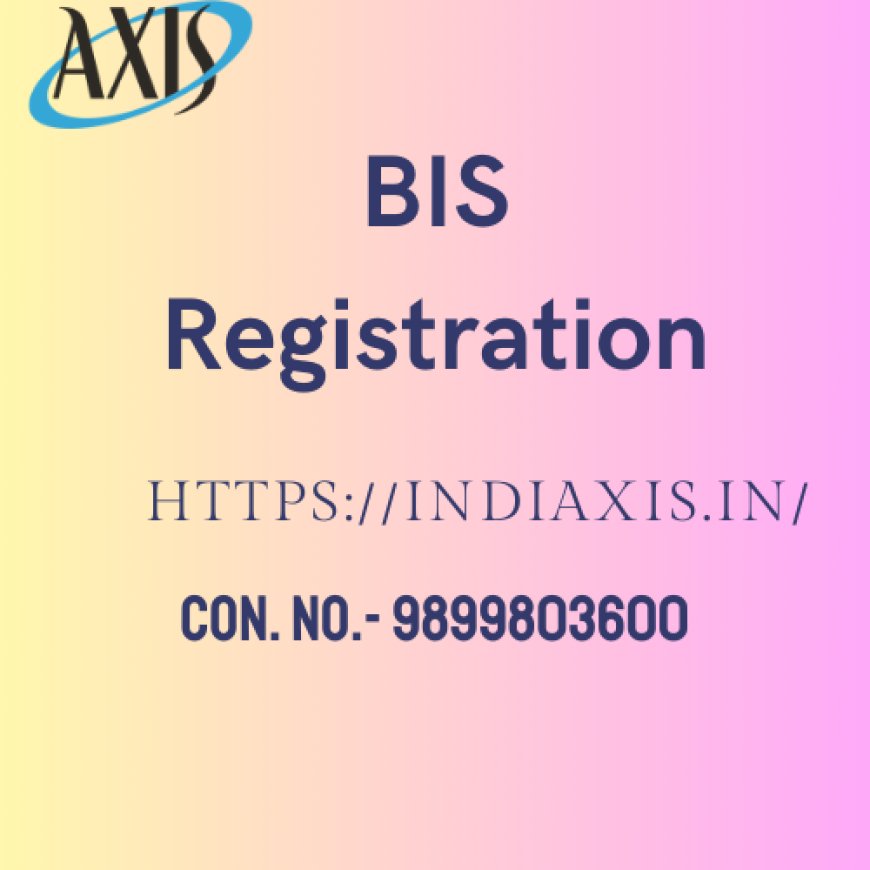BIS Registration
Get BIS Registration for your products to meet Indian quality and safety standards. Learn about the process, benefits, and requirements for BIS certification to ensure compliance and market approval

Bureau of Indian Standards (BIS) is the national standards body of India, responsible for ensuring quality, safety, and reliability in various products. BIS Registration is a mandatory requirement for manufacturers, importers, and traders who wish to sell their products in the Indian market. The certification ensures that products meet predefined standards, offering consumer safety and compliance with regulatory requirements.
Importance of BIS Registration
BIS Registration plays a crucial role in maintaining product quality and consumer trust. It ensures:
-
Compliance with Indian regulatory standards
-
Improved market credibility and acceptance
-
Prevention of substandard and hazardous products
-
Enhanced consumer safety and satisfaction
-
Facilitation of international trade by meeting quality norms
Legal Compliance and Mandatory Certification
The Government of India, through the Ministry of Consumer Affairs, has mandated BIS Registration for various product categories under the Compulsory Registration Scheme (CRS). Products such as electronics, household appliances, chemicals, and industrial goods require BIS certification to be sold legally in India.
Types of BIS Certification
BIS provides several types of certifications depending on the nature of the product and industry. These include:
1. ISI Mark Certification
The ISI mark (Indian Standards Institute) is a certification that signifies conformity to Indian Standards (IS). It is mandatory for certain products such as electrical appliances, cement, and steel products.
2. Compulsory Registration Scheme (CRS)
CRS applies to electronics and IT products such as mobile phones, LED lights, and adapters. Under this scheme, manufacturers must obtain BIS Registration before selling their products in India.
3. Foreign Manufacturers Certification Scheme (FMCS)
This scheme is designed for foreign manufacturers looking to export their products to India. It ensures that imported products meet the required Indian standards.
4. Hallmarking Certification
Hallmarking applies to precious metals such as gold and silver. It guarantees purity and authenticity, ensuring that consumers receive high-quality products.
BIS Registration Process
The BIS Registration process involves several steps, ensuring that only quality-approved products enter the Indian market. Below is a step-by-step guide:
1. Identify the Applicable Standard
Before applying, manufacturers must determine the Indian Standard (IS code) applicable to their product category.
2. Product Testing in BIS-Recognized Labs
Manufacturers must send product samples to BIS-approved laboratories for testing. The laboratory evaluates parameters such as safety, durability, and efficiency.
3. Submission of Application
Once testing is complete, the manufacturer submits an online application along with the necessary documents, including:
-
Test reports
-
Business registration details
-
Manufacturing facility information
-
Authorized signatory details
4. Factory Inspection (If Required)
For certain products, BIS officials may conduct an on-site factory inspection to verify manufacturing processes and compliance with standards.
5. Grant of BIS Registration
If all requirements are met, BIS grants the registration certificate, allowing manufacturers to use the BIS mark on their products.
Documents Required for BIS Registration
Proper documentation is crucial for obtaining BIS Registration. The following documents are typically required:
-
Company registration certificate
-
Product test report from a BIS-approved lab
-
Details of manufacturing process and equipment
-
Factory license and layout
-
Authorization letter (for representatives)
-
Proof of business address
Benefits of BIS Registration
BIS Registration provides several advantages to manufacturers, importers, and consumers alike.
1. Ensures Product Quality
With BIS certification, consumers are assured of product quality, safety, and reliability.
2. Enhances Brand Value and Market Acceptance
A BIS-certified product is more likely to gain consumer trust, thereby increasing sales and brand reputation.
3. Reduces Product Recalls and Legal Issues
By complying with BIS standards, manufacturers can avoid legal penalties, product recalls, and potential safety hazards.
4. Facilitates International Trade
BIS certification aligns Indian products with global quality norms, making it easier to export goods to international markets.
5. Competitive Edge in the Market
A BIS-certified product has a competitive advantage over non-certified products, improving business prospects in the long run.
List of Products Requiring BIS Registration
Several product categories require mandatory BIS Registration. Some of them include:
-
Electronic goods (mobile phones, laptops, LED lights)
-
Electrical appliances (switches, cables, batteries)
-
Household items (pressure cookers, gas stoves)
-
Construction materials (cement, steel rods)
-
Automotive components (helmets, tires)
-
Medical devices (gloves, syringes)
Challenges in BIS Registration Process
Despite its benefits, the BIS Registration process poses certain challenges:
-
Time-Consuming Process: The approval and testing procedures can take several weeks.
-
Cost Implications: Testing and registration fees can be high, especially for small manufacturers.
-
Frequent Policy Changes: BIS regulations may change, requiring businesses to stay updated with compliance norms.
-
Technical Complexity: Understanding BIS standards and technical requirements can be challenging for first-time applicants.
How to Ensure a Smooth BIS Registration Process
To avoid delays and complications, businesses should:
-
Work with BIS-certified consultants for expert guidance
-
Conduct pre-testing of products before submitting to BIS labs
-
Keep documentation updated and error-free
-
Stay informed about BIS regulatory changes
BIS Registration Renewal and Validity
BIS Registration is valid for one to five years, depending on the product category. Manufacturers must apply for renewal before the certificate expires. The renewal process involves submitting updated documents and product test reports.
Conclusion
BIS Registration is an essential compliance requirement for manufacturers and traders looking to enter the Indian market. It ensures product quality, enhances consumer trust, and facilitates smooth business operations. By understanding the registration process, required documentation, and compliance norms, businesses can successfully navigate the certification process and gain a competitive edge in the industry.
What's Your Reaction?








![Evergreen Farms CBD Gummies review 2024 [Shark Tank] Updated Scam Alert For](https://news.bangboxonline.com/uploads/images/202502/image_430x256_67a7472f0e045.jpg)




















